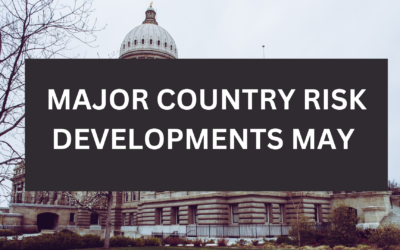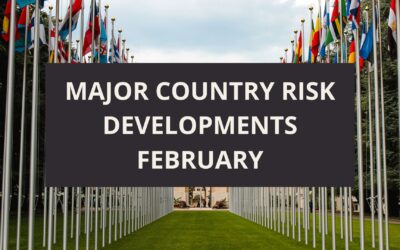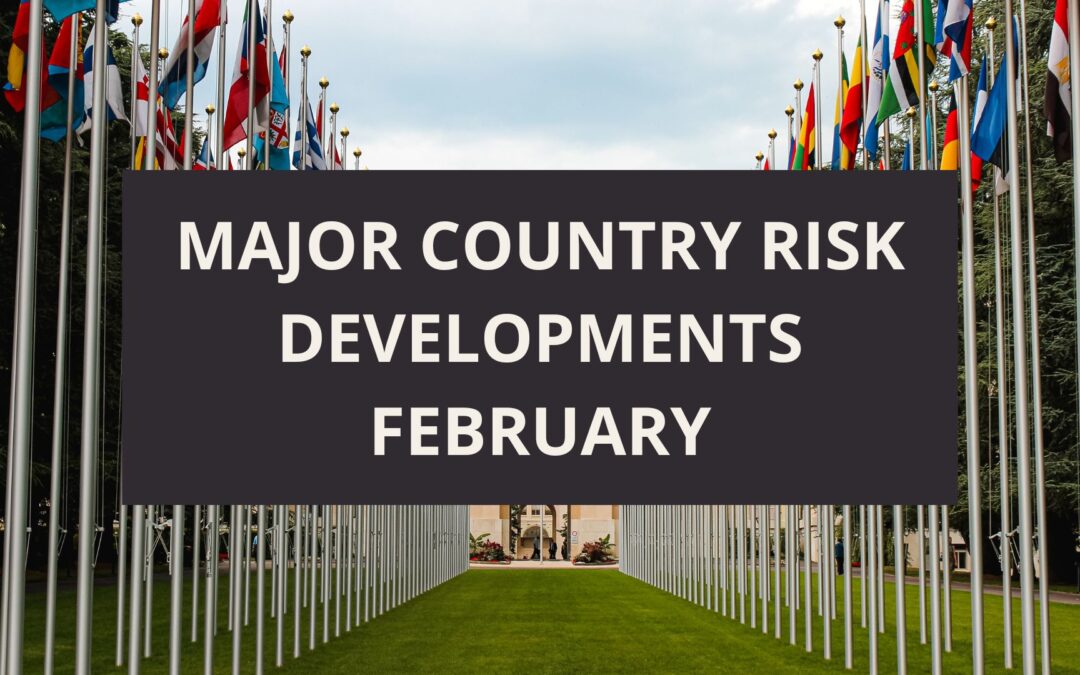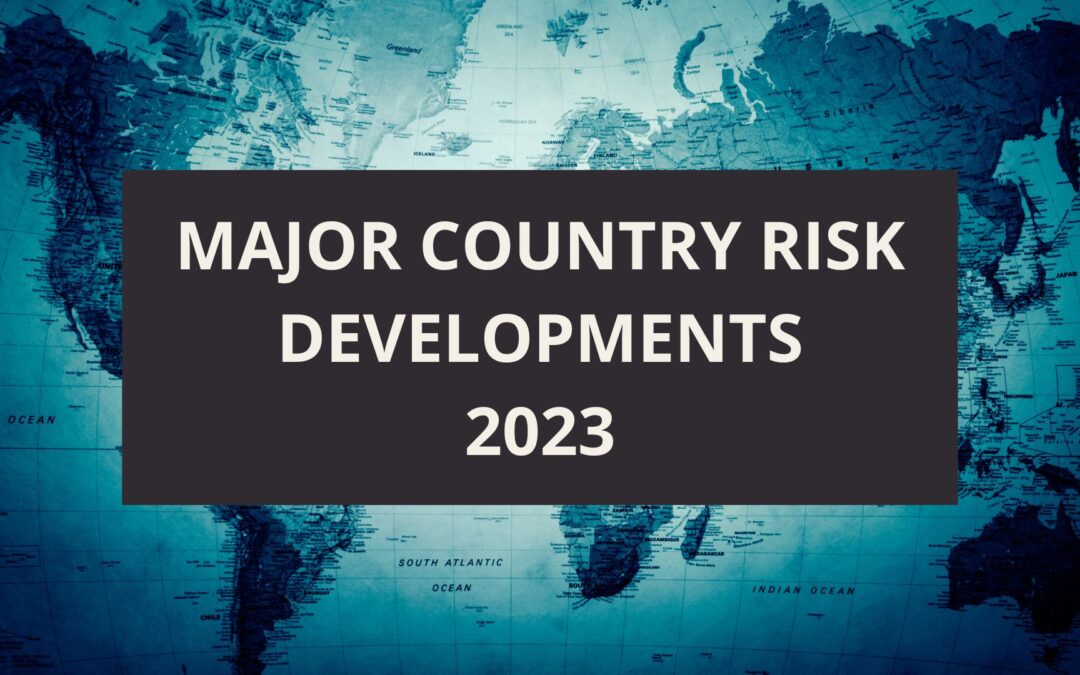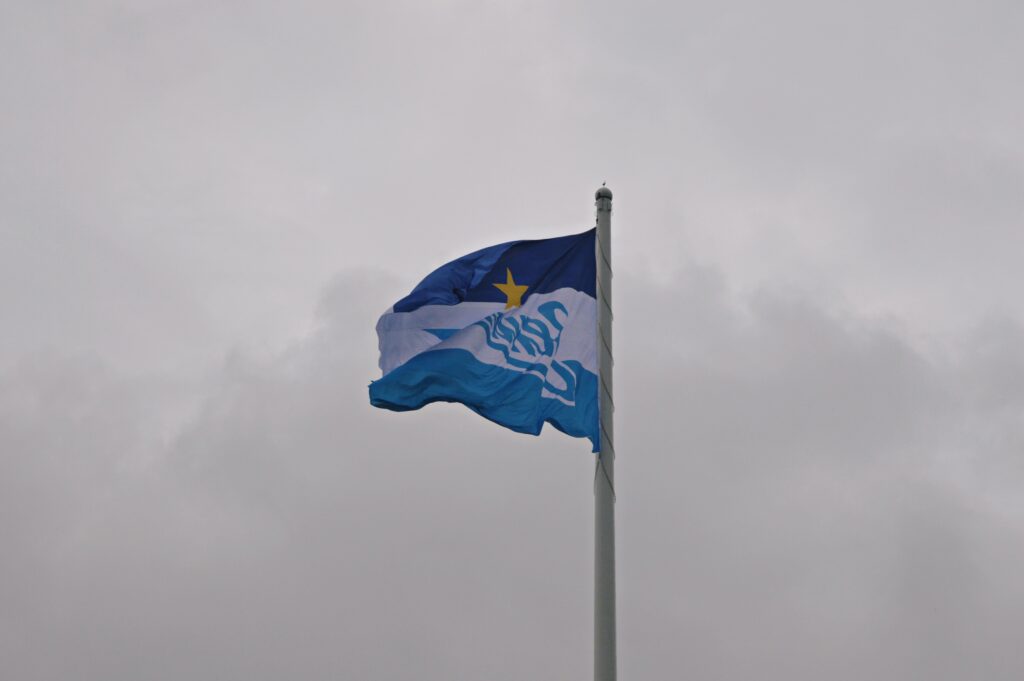Posted with permission from greatamericaninsurancegroup.com Overview There appears to be developments on the...
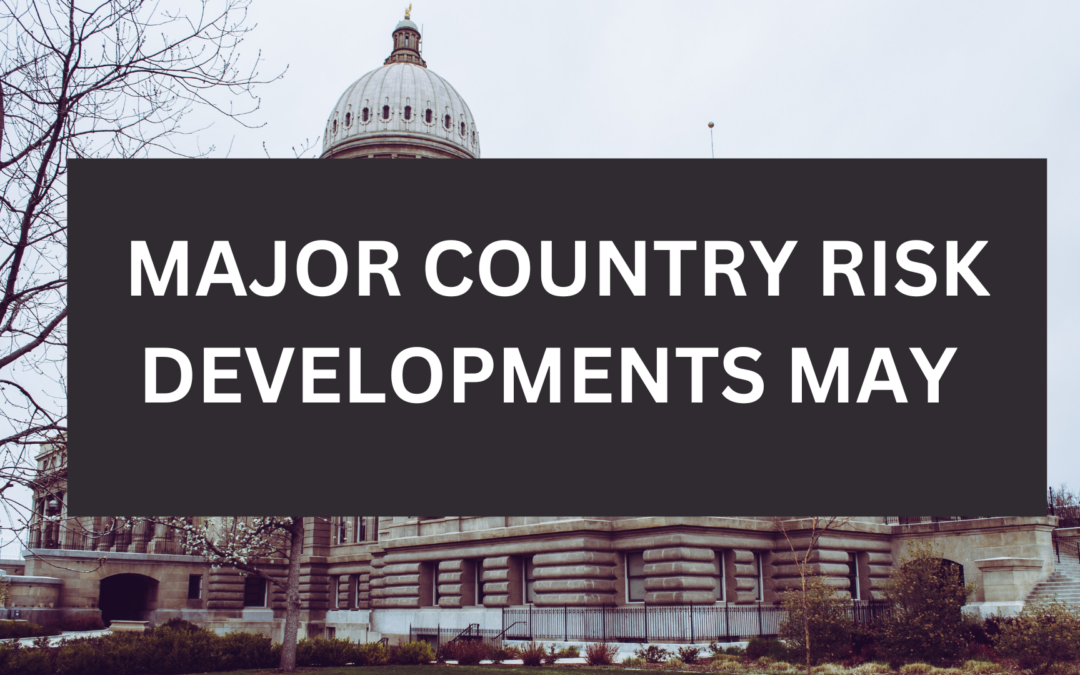
Major Country Risk Developments May 2023
Overview
There appears to be developments on the diplomatic front in the Russian war on Ukraine. The Chinese leader Xi Jinping spoke with Ukraine’s president and announced that China would appoint an envoy to work towards a peace settlement. While China’s peace plan release earlier this year, was vague and did not call for the withdrawal of Russian troops, the latest move is one more step. China clearly has unique leverage with the Russian President if it chooses to use it. In the face of western sanctions, Russia is reliant on China to help keep its economy afloat. It would be careless to dismiss the idea that China could play a role in ending this brutal conflict. For different reasons, Ukraine, Russia, the U.S., Europe, and China itself all have a potential interest in Beijing’s involvement.
There is no doubt that both the Russian and Chinese leaders are united in their hostility to U.S. power. A swift Russian victory in Ukraine might have suited China well. But a prolonged war is turning into a strategic liability for Beijing. Rather than weakening the U.S.-led alliance system, the war in Ukraine has pulled the U.S., Europe, and Asian democracies closer together.
China has spent decades trying to build its influence in Europe and around the world. But its self-proclaimed “no limits” partnership with Russia has convinced many Europeans that Beijing is now a threat, too. Both Americans and Europeans are using the same language about “de-risking” their relationship with China by reducing economic dependencies. This matters to Beijing because the EU is China’s largest export market. Military ties between Japan, Europe and the U.S. are also strengthening. The best way for Beijing to rebuild its reputation in Europe would be to play a visible and positive role in ending the war. Such a move would also have a global impact, supporting President Xi’s preferred narrative that American power is in retreat and that China is a force for peace.
China is basking in the positive publicity gained from its role in normalizing relations between Iran and Saudi Arabia. The Chinese also chaired a conference on peace in Afghanistan. Beijing have even hinted at mediating in the Israeli-Palestinian peace process.
Washington is also keen to find a way of ending the war in Ukraine. It knows that the longer the conflict continues, the harder it will be to maintain a western consensus on pouring billions in military and economic aid into Ukraine. The mainstream view in Washington, and in many European capitals, is that the Ukrainians should be given as much support as possible. The Ukrainian goal is to win such a decisive victory that the Putin era is ended. But everyone knows that’s a long shot. A more likely outcome is that Ukraine strengthens its hand on the battlefield, ahead of peace talks. The U.S. side seem to have warmed to the idea that China could play an important role in getting Russia and Ukraine to the negotiating table.
There have been many discussions of whether the western alliance would put pressure on Ukraine to negotiate. Less discussed, but probably more important, is who could force Russia to make meaningful concessions-including withdrawing from occupied territory and abandoning the effort to wreck Ukraine. The only plausible answer to that question is China. Only President Xi can offer a warm handshake to Putin in public- and a twisted arm in private. At some point, the Chinese leader could decide that it is in his country’s interests to do just that. The rest of the world appears ready for such a development.

USA
The U.S. labor market has been hot lately, but some employers are now slowing hiring. April’s strong job growth (253,000 positions filled) suggests the job market is resilient amid banking sector turmoil, rising interest rates and elevated inflation. Unemployment stands at a record low of 3.4%. However, the economy also grew more slowly at the beginning of 2023 than it did in Q4 2022. Businesses have eased back on investments, while the housing market remains weak. Layoffs in the tech sector climbed with indications of some cooling in new hiring. April’s monthly payroll increase was slightly below the average monthly gain of 290,000 over the prior six months.
Demand for certain metal parts has slowed over the past 18 months. These are parts used in tractors, electrical hardware, lawn mowers, etc. Weaker sales and productions volumes will mean less need for workers. The share of U.S. workers in their prime working years, ages 24 to 54, who are employed or seeking jobs has climbed over the past year. The influx of job seekers is allowing hotels, bars, and restaurants to snap up workers after struggling with acute labor shortages over the past three years. Healthcare providers, some manufacturers and other services are also staffing up, replacing workers who quit or retired early during the pandemic. Job gains at providers of in-person services, such as restaurants, have offset recent cuts at large companies such as Facebook parent Meta Platforms, Google parent Alphabet and Walt Disney.
Meanwhile, wage growth is still running above pre-pandemic levels but is cooling as more Americans seek work. Slowing wage growth is some comfort to the Federal reserve who worry that strong earnings gains would fuel continued inflation above the central bank’s 2% target. The Fed approved its 10th consecutive interest rate increase on May 1 and signaled it may be done with increases for this current cycle. This latest move brings the benchmark Federal funds rate to a range between 5% and 5.25%, a 16-year high.
Fed officials considered skipping a rate increase in March after the failures of two regional lenders, Silicon Valley Bank and Signature Bank, raised concerns about a bank funding crisis. Federal regulators recently seized another regional lender, First Republic Bank, orchestrating a sale to JPMorgan Chase. The banking stress could lead to tighter lending conditions for businesses and households that ultimately results in layoffs.

Turkey
Tens of thousands of Turkish nationals living in Europe have cast ballots in early voting for upcoming May 14th elections, with President Recep Erdogan counting on diaspora support as he battles to cling to power. According to early indications there has been a record turnout among Turkey’s 3.4 million overseas voters, who have historically backed Erdogan, after polling stations opened just over two weeks ahead of the main election on May 14.
The Turkish government has embarked on a voter drive that it says is aimed at boosting democratic participation by increasing the number of polling stations across Europe and pumping out messages on the importance of taking part. They insist that these efforts are not meant to bolster support for President Erdogan, who is fighting the toughest re-election campaign of his 20-years in power as Turkey’s deep economic malaise has dented his support.
Erdogan’s ruling AKP party openly acknowledges that a higher turnout among the diaspora should benefit the incumbent, given that in the past a majority of diaspora voters have backed Mr. Erdogan. The opposition forces say this time it will be different, as the political winds in Turkey are believed to have shifted. Germany alone accounts for 3 million strong Turkish diaspora- of whom an estimated 1.5 million are eligible to vote.
Opposition parties complain that President Erdogan has mobilized huge resources in Germany, including about 300 mosques funded and run by the Turkish state. Erdogan has performed better in Germany in past elections than in Turkey, gaining 65% of the votes cast in Germany in 2018 compared to 58% at home. However, the picture is distorted by the fact that only about half of Germany’s Turkish population- which includes exiled Kurds, leftists, academics, and journalists as well as religious conservatives – are Turkish passport holders who are eligible to vote.
Kemal Kilicdaroglu is the leading opposition candidate facing- off Mr. Erdogan, with the message that if he is elected democracy will grow, money will flow, investments will pick up, the currency will strengthen, and prosperity will come. The Turkish opposition is hammering home to voters that runaway inflation (70%) under President Erdogan has hurt all households. He cites that the price for a kilo of onions, vital for Turkish cuisine, has increased fivefold over the past 18 months. The president by contrast, boasts of Turkey’s strength and influence under his leadership. The contrasting images epitomize the stark choice voters face in the May 14th elections: a charismatic strongman who has towered over the country’s politics for two decades, or a soft-spoken retired bureaucrat who is betting that years of creeping authoritarianism and soaring living costs will finally convince voters of the need for change.
An opposition victory, particularly by a narrow margin, would test Erdogan’s commitment to democracy, as well as the allegiances of a judiciary, police, and military that he has spent two decades striving to bring under his control. If Erdogan, who displays an increasing intolerance for dissent, secures another term, his critics fear he will steer Turkey deeper into authoritarianism. Most polls suggest Kilicdaroglu, leader of the Republican People’s Party (CHP), enjoys a slim lead over the incumbent, with his chances buoyed by the fact the traditionally fractious opposition is at its most unified in its years-long quest to unseat the president.
The outcome could also determine the direction the $900 billion economy takes. Turkey urgently needs to attract foreign investment to manage a current account deficit that is near its widest level since records began and to replenish diminishing foreign exchange reserves. It is a crisis that has dented Mr. Erdogan’s popularity as he has pursued an unorthodox monetary policy, opposing interest rate rises even as inflation has soared and dismissing three central bank governors in less than four years. Yet his supporters insist he is the only person capable of fixing the country’s problems.

China
China’s manufacturing purchasing managers’ index (PMI), which includes the services and construction sectors, scored 56.4 in April, down from 58.4 in March. This shows continued expansion since the country’s zero-Covid policy was lifted in December. A reading above 50 indicates expansion compared with the previous month, while a reading below 50 means a contraction. However, this is a mixed report and suggests that China’s post-Covid recovery has lost some steam and requires continued policy support.
In a sign of China’s economic recovery from last year, media reports forecast about 240 million passenger trips during the first week of May [the five-day May Day holiday], higher than in 2019 before the pandemic. While consumer activity is rebounding from a low base, the rest of the economy has deeper challenges, with the real estate sector still limping after a government crackdown and export markets fading as advanced economies weaken. China’s recent PMI shows a similar picture, with growth in manufacturing dipping despite recovery in exports, while other sectors showed a rapid rise in activity, indicating an uneven recovery.
Economic growth has exceeded expectations and the Chinese economy is off to a good start this year. However, the underlying drivers to growth remain weak and market demand appears insufficient to sustain momentum. Production expanded slightly, but sub-indices for new orders, raw material inventories and employment in the manufacturing sector all fell in April. China’s import volume in April posted its biggest contraction in a year (down 7.9%), while exports expanded at a slower pace than expected casting doubt over the pace of the economic recovery. Part of a recovery in construction activity was driven by infrastructure. Beijing has used infrastructure to stimulate growth following the real estate sector’s collapse over the past two years. The government has signaled more state-stimulus support for the recovery and has called for targeted “proactive fiscal policy” and “prudent monetary policy”. This will include raising incomes for urban and rural residents and boosting consumption of services in sectors such as culture and tourism.
The consensus is that China’s export industries will remain under pressure due to ongoing global tech slowdown, heightened global financial turmoil and deteriorating U.S.-China trade relations. The export slowdown will likely continue to hinder the recovery of employment and manufacturing investment. Factory activity showed signs of sluggishness and authorities have warned of an incomplete recovery as global demand for goods waned.
Meanwhile, the U.S. Chamber of Commerce in China has warned that mounting Chinese scrutiny of U.S. companies has dramatically raised risks of doing business in China, as signs emerge that Beijing may be cracking down on some foreign businesses. The business lobby group asserted that it was closely monitoring China’s scrutiny of U.S. professional services and due diligence firms.
The warning follows reports that Chinese police had raided the Shanghai offices on Bain, the U.S. management consultancy. It also follows China’s introduction of a new counter-espionage law that has made foreign companies even more nervous. The new law casts a wide net over the range of documents, data or materials considered relevant to national security, the additional scrutiny of firms providing essential business services dramatically increases the uncertainties and risks of doing business in the PRC.
U.S. officials and executives have become worried in recent weeks about a series of actions by Chinese authorities that have targeted U.S. companies, particularly those involved in due diligence and risk assessment, or working on projects involving advanced technology supply chains. In April, authorities raided the Beijing office of due diligence group Mintz Group and detained five employees. The U.S. Administration has also become increasingly concerned about the apparent rise in coercive activity in China.
The increased scrutiny, accompanied by widespread speculation about actions against other western groups operating in China, comes at a time when Beijing has been trying to send a message that it welcomed foreign investment as it ends a long period of zero-Covid restrictions. The U.S. Chamber of Commerce said it welcomed pledges of openness but asserted that foreign investment will not feel welcomed in an environment where risk can’t be properly assessed, and legal uncertainties are on the rise.
In April China opened a national security investigation into Micron, the Idaho-based manufacturer of memory chips. U.S. officials believe Beijing is retaliating
against U.S. measures to make it much harder for Chinese companies to obtain advanced semiconductors.
These concerns come weeks before the G7 summit in Japan when national leaders are expected to discuss economic coercion in the context of what measures they could take to push back against Chinese actions. Furthermore, cash-strapped local authorities in China are struggling to reduce headcount because of demands from Beijing for greater security and monitoring of its citizens. Local authorities have in recent years hired millions of people to collect information on residents, identify security risks and communicate state policy as President Xi Jinping tightens control on society. These same local authorities reported the biggest decline in fiscal revenue in decades last year – due to Beijing’s zero-Covid lockdowns stifled growth, even as it forced more spending on mass testing and quarantines.
Income for local authorities have been hit hard by a crash in the property market-land sales account for about 25% of all revenue for local governments, which are responsible for everything from roads to healthcare and education. As a result, the authorities are under pressure to reduce staff and cut costs. China’s State Council, the cabinet, unveiled plans last month to reduce its headcount by 5%, a signal for cities and provinces to follow suit. Elsewhere, Chinese local governments are wooing Middle Eastern and Asian sovereign wealth funds as they struggle to raise money at home to stimulate post- pandemic economic development. Local government officials have reportedly held high-level meetings with Qatar Investment Authority, subsidiaries of Saudi Arabia’s Public Investment Fund and the Abu Dhabi Investment Authority.
Asian state investors, including Singapore’s GIC, have also been approached about taking investment opportunities on the mainland.
These overtures underscore the deepening economic and diplomatic ties between China and the Middle East. A region that has traditionally been a U.S. sphere of influence. They also come as global investors attempt to secure Middle East cash, with Gulf nations flushed with petrodollars after last year’s oil boom.

Brazil
Political noise and high interest rates are worsening financial conditions in Brazil. President Lula’s aggressive rhetoric against the governor of the central bank and his continued criticisms of that institution’s autonomy, has triggered market jitters. Local capital markets are deepening and competition between lenders is rising. The large private banks are well managed and mostly well capitalized. They also hold a fair amount of government paper (investments). Equity and corporate bond markets have strengthened and will offer alternative financing opportunities. The government has dialed back subsidized credit, but it is expected that the role of public banks will be expanded under President Lula. The administration sees this as an engine to help foster growth.
There are few restrictions on foreign firms gaining access to the Brazilian market. Even so, should Mr. Lula fail to pass important reforms of his policy agenda (such as a new fiscal rule and a simplified tax system) during his first year in office, or a sluggish economy hits his popularity, he could pursue more erratic policies to spur growth. Investors continue to monitor policy moves that would suggest much more expansionary credit policies, as this would create distortions affecting Brazil’s market for long-term credit.
Although its institutions have withstood recent crises, Brazil could face political stability risks during President Lula’s term in office, as the country remains deeply polarized. A mobilized right-wing opposition and a polarized Congress will muddle Lula’s task of securing a solid legislative majority, dampening his agenda’s progress. Protests are possible, although a repeat of the storming of government buildings in January is unlikely, as far -right extremists realize that there was widespread condemnation of those acts of vandalism and because the security forces now have better information about their activities. The Lula government will be closely monitoring their activities. The Lula government will have to navigate this tricky political environment through continual pork-barreling, which could weaken political stability, as the risk of corruption scandals will rise.
Sluggish economic growth, high interest rates and elevated (albeit declining) inflation will cause growth to weaken in 2023. Deteriorating credit conditions will further aggravate this slowdown as loan costs increase, credit growth weakens, and delinquency rates rise. These factors will likely constrain private consumption and export volume growth, and worsening fiscal dynamics will limit space for public investments. Public external debt is moderate. However, the public debt/GDP ratio is expected to drift upwards (from 75% currently), given that President Lula has vowed to implement large social benefits and increase public expenditure.
There is a fairly liberal attitude towards foreign investment, but taxes were introduced to reduce portfolio inflows (to ease currency-appreciation pressures) during the 2004-12 commodity boom and purchasing of rural land by foreigners is frozen. The transformation of Brazil’s external accounts has reduced vulnerability to external shocks, minimizing the risk of controls on capital outflows.
Infrastructure spending has been traditionally low. Public projects have barely advanced amid fiscal constraints and operational issues. Lula is considered as having a more pragmatic approach to attracting private capital in infrastructure. The expectation is that Lula will maintain public-private partnerships for transport projects that expanded under his predecessor, Jair Bolsonaro. Roads between major urban centers are fair, but many small roads are unpaved. Privatization of several major and regional airports through auctions has boosted capacity. Telecommunications improved after privatization a decade ago, but capacity bottlenecks have emerged. Internet speed is improving, but still lags behind many countries. Meanwhile transmission failures cause sporadic power outages. With 70% of the national electricity supply from hydroelectric plants, the grid remains structurally exposed to drought (although rainfall has been plentiful recently).
President Lula on a recent visit to China called for emerging markets to trade using their own currencies. Still about half of all cross-border debt is dollar-denominated. And although the dollar’s share of central-bank reserves has fallen over time, it still accounts for about 60% of them. Chinese interests in Brazil continues to expand and Lula’s recent visit underscores the importance of this partnership to both countries.
Against the backdrop of a slowing economy, his popularity is below 40%–lower than at the same stage in his previous two administrations (2003-10), presaging a challenging four-year term. Political tensions remain elevated, although they have eased since right-wing extremist supporters of the former president, Jair Bolsonaro (2019-22), mounted a violent insurrection in Brasília (the capital) on January 8th.
What is increasingly clear is that individual countries can circumvent the existing dominant system if they really want to. China’s alternative to the SWIFT interbank-messaging system has been growing rapidly. It has also been switching more of its bilateral trade towards settlement in renminbi – an easier task than replacing the dollar in trade flows between other countries. Even many firms in the West now use renminbi for trade with China. New digital-payment technologies and central bank digital currencies could yet make it easier to move money around the world without involving the U.S.

Egypt
Egypt’s Gulf allies have shifted from handing out traditional support to instead seeking commercial deals and demanding reforms from Egyptian authorities. Meanwhile, Egypt struggles to sell-off state assets in its effort to ease a foreign currency and funding crisis, as Cairo’s traditional Gulf allies toughen their approach to supporting the country. As part of a $3bn loan package agreed with the IMF in October — its fourth since 2016 — Cairo agreed to reduce the footprint of the state, including the military, in the economy. Funds from asset sales are also seen as crucial to ease a severe foreign currency shortage and fill a financing gap the IMF estimates will be $17 billion over the next four years.
Oil-rich Gulf states have traditionally bailed out their neighbor in the decade since President Abdel Fattah al-Sisi seized power and were expected to be key buyers of Egyptian assets. Cairo has identified 32 public-sector companies it plans to open to private-sector participation, but since signing the IMF deal it has not announced any significant sales. The lack of progress underlines the tougher stance being taken by regional donors, including Saudi Arabia, the United Arab Emirates and Qatar. Gulf capitals have become less willing to provide traditional financial support, instead seeking commercial investments and expecting recipient governments to implement reforms. Observers have warned of a mismatch between Cairo’s expectations and those of Gulf sovereign wealth funds. Egypt’s position is to sell state assets at a massive premium to market prices because the Egyptians argue the current markets are depressed and don’t represent the long-term value according to those briefed on the discussions. There remains a huge amount of daylight between the two sides.
Observers have also questioned the willingness of President Sisi’s military-led regime to start reforms, including curbing the army’s business interests, which have markedly expanded under Sisi and stretch from agriculture and fish farms to construction and food factories. The Saudis are reportedly annoyed and frustrated that the Egyptians take them for granted. The Saudis are seeking meaningful reforms and expect a structural reform plan to be in place.
Saudi Arabia’s Public Investment Fund, which committed to invest $10bn in Egypt, recently pulled out of talks to buy state-owned United Bank after a fall in the Egyptian pound wiped hundreds of millions off its dollar value, according to an international banker and another person familiar with the discussions. The PIF declined to comment. The currency has lost nearly 35 per cent of its value against the dollar since Cairo agreed in October to move towards a more flexible exchange rate regime as part of the IMF package. Shoppers in a Cairo market amid Egypt’s economic crisis.
The government has few other ways to raise capital beyond asset sales to Gulf allies, analysts say. The Qatar Investment Authority, meanwhile, has rejected the offer of a stake in a military-owned biscuit manufacturer. The Qataris are willing to put in the money, but it needs to be a smart investment, it needs to be making money, or in a few rare cases at least breaking even,” said a person briefed on the discussions. They won’t just throw money away.
They are trying to find the right opportunity. According to recent reports the Egyptian military would resist selling profitmaking assets. However, the real issue [for buyers] is that military companies depend entirely on state funding in the form of an assured flow of government procurement contracts, subsidies, and the ability to transfer losses to the treasury. There is little attraction for outside investors unless they are assured of the continuation of these privileges. Abu Dhabi’s sovereign fund ADQ, the prime UAE vehicle investing in Egypt, has paused its projects in the country. There is no appetite for anything substantive right now. This could change following the visit by UAE president Sheikh Mohammed bin Zayed al-Nahyan to Cairo in May. The UAE remained committed to helping Cairo, but Abu Dhabi was more likely to channel support via the IMF program.
Egypt was plunged into crisis last year after foreign bond investors pulled about $20 billion out of Egyptian debt around the time of Russia’s invasion of Ukraine, amid jitters over the impact of the war on emerging markets. The authorities had been relying on the foreign portfolio’s inflows to fund its current account deficit. Cairo was forced to turn to the IMF and its Gulf allies, with Saudi Arabia, the UAE and Qatar depositing a total of $13bn in the central bank.
In a sign of Gulf nations’ shifting approach to assistance, the IMF’s Middle East director announced that the Fund had increased co-operation with Gulf states, including in the design of programs. The IMF interacts with Gulf authorities more frequently to make sure the additional financing [they provide] is also helping implement the reforms the IMF programs aim to achieve. Recently, the IMF said Gulf states had pledged $41 billion to Egypt, Jordan, Pakistan and Yemen in official support and investments and had disbursed or rolled over more than $22 billion to date.

Peru
Peru is more divided and unstable than at any point since the 1980’s. The country needs fresh elections. Peru’s president, Dina Boluarte, has withstood a wave of anti-government protests that erupted after she took office on December 7th, following the ouster of President Pedro Castillo.
However, Ms. Boluarte relied heavily on the police and military forces to suppress the protests, which seem to have abated for now. Journalists and human rights groups have documented multiple cases of alleged excessive use of lethal force. This level of repression and a lack of accountability are exacerbating an erosion of democracy in Peru. This democratic backsliding, which also reflects voter demands for a return to order after an extended period of political volatility, raises the risk that a right-wing authoritarian could eventually gain power.
Although the number and intensity of the protests have calmed down recently, and despite an assertion by some that the country has been “pacified”, there has been no peaceful settlement between the government and protesters. On the contrary, the authorities deployed strong-arm tactics to quell demonstrations, including deadly force, arbitrary arrests, intimidation, and the stigmatization of demonstrators as terrorists or criminals in official discourse. As a result, many expect political instability to remain, and we highlight the risk that these developments have set the scene for a move towards an authoritarian government reminiscent of that led by Alberto Fujimori in the 1990s.
Nearly 50 civilians have been killed in the recent unrest—the highest death toll in a single protest movement since Peru restored its democracy in 2000. Since demonstrations turned violent in December, Ms. Boluarte has relied on emergency powers and the military and police forces to contain dissent. She has also sought to quash expressions of anti-government sentiment by proposing regulations to control media coverage of protests, and by increasing prison time for people convicted of terrorism while states of emergency are in place. Moreover, the consequences for officials accused of committing deadly violence have been minimal. Ongoing criminal investigations into the incidents are likely to be shelved; no member of the Peruvian security forces has been convicted this century for killing civilians or protesters in clashes.
The government’s heavy-handed approach and limited accountability reinforce a wider trend: the deterioration of political culture in support of democracy. As the political environment has become more unstable (there have been six presidents in as many years), politicians and voters alike have abandoned once-powerful taboos against openly supporting authoritarian practices. As a case in point, the loser of Peru’s last general election in 2021, Keiko Fujimori, sought to overturn the result by making unfounded allegations of electoral fraud, and the winner, Mr. Castillo, attempted a self-coup less than two years later. These events meant that Peru was downgraded to a “hybrid regime” by the Economist Intelligence Unit’s, December, 2022 Democracy Index.
This erosion of democracy, together with the current political crisis, the growing role of the military and a desire for a restoration of order, all heighten the risk that a right-wing authoritarian leader could return to power sooner or later. There is no indication that the interim president, Ms. Boluarte plans to stay in power (she proposed holding early elections in 2024, although she stopped mentioning this possibility more recently). The risk of a military coup is also very low, despite the outsized role that the armed forces currently play. Rather, the expectation is that a right wing populist candidate could easily capitalize on rising polarization within Peru and voters’ demand for a heavy handed approach to unrest -and win the next election, which is expected at some point in 2024. A recent survey by Ipsos, a local pollster, showed that 24% of Peruvians would vote for “a strong leader, willing to act with a heavy hand to impose order”.
Should a right-wing authoritarian win the next election (which we expect to be held at some point in 2024), we would expect them to broadly maintain macroeconomic orthodoxy, but also attempt to erode institutions, including the electoral authorities and judiciary. They may well have enough legislative support to pass laws that weaken checks and balances; right-wing parties currently in Congress have called for a harsher crackdown on protesters. Although a right-wing authoritarian regime may not harm the business environment in the short term, the ensuing weakening of institutions could erode the rule of law and increase policy instability over the medium to long term, raising operational risks for firms.
For now, the situation remains uncertain, and the ascent of a right-wing authoritarian figure is by no means inevitable; elections in Peru are extremely volatile, hotly contested affairs, and another left-wing populist like Mr. Castillo could still win. However, on balance the risk that Peru falls into authoritarianism has increased. The obvious way to calm the country would be to call a fresh general election.
The constitution does need reform, but its pro-market economic chapter, which leftists want overturned, has underpinned Peru’s rapid growth and poverty-reduction over the past three decades. To remove this incentive would turn away many perspective investors and undermine many of those already operating in the country.
Peruvian society is more polarized today than it has been since at least the 1980’s. Without a clear signal from leaders on both the right and the left, on a path toward restoring democratic government, the damage to business confidence will soon become a drag on consumer confidence and potentially darken the outlook for economic rebound which the country now desperately craves.
Since 2004, Securitas Global Risk Solutions, LLC (“Securitas”) has helped clients develop credit and political risk transfer solutions that provides value on numerous levels. As an independent trade credit and political risk insurance brokerage, Securitas is focused on developing comprehensive solutions that meet the needs of clients, ensuring complete understanding of policy wording and delivering excellent responsive service.
By Byron Shoulton, FCIA’s International Economist For questions / comments please contact Byron at bshoulton@fcia.com
Recommended News
Major Country Risk Developments May 2023
Top 5 Benefits of Trade Credit Insurance
How does trade credit insurance work? Trade credit insurance is a type of insurance that protects businesses from the...
Major Country Risk Developments, February
Posted with permission from greatamericaninsurancegroup.com Overview Federal Reserve has dialed back on the pace of...

